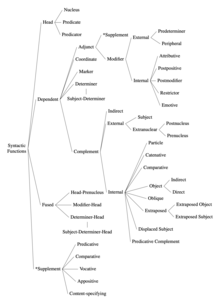Appendix:English grammar
Appearance
(Redirected from Appendix:English gerund)
Categories
[edit]
Gerund
[edit]Key concepts
- -ing-form
- gerund
- gerund-participle
- present participle
- gerund phrase
- noun form
- verb form
- plural
- modification by adjective
- modification by adverb
In English, a gerund is an occurrence of an -ing-form such as “swimming” such that it can act as a noun, by taking the grammatical role of the subject or the object of a verb. Gerunds in all cases are of exactly the same form as what are called present participles. Gerunds can be considered different uses of the same form as present participles.
What is in other languages called “gerund” may substantially differ from gerund in English.
Examples of noun use of gerund-participle:
- “I like swimming.”
- “Climbing can be dangerous.”
- “Swimming competitively consumed more than 20 hours a week for practice and travel.”
- “Competitive swimming is my favorite activity.”
- “They got together to talk swimming.”
- “He took to swimming in the morning before work.”
- “This is what I wear for swimming.”
- “There were four swimmings of the Channel that year.”
Adjective use of gerund-participle
- “I’ve been on swimming teams since I was eight.”
- “The swimming seal moved much faster than the one on the sand.”
To be classified/labeled:
- “My dad took us swimming in the river.”
- “I’d love to go swimming.”
- “What makes it worth swimming the Channel.”
- “I’d be happy swimming every day.”
- “Night swimming is nice.”
Examples of present participles in progressive use:
- “I am writing a letter.”
- “I have been shopping.”
- “By six o’clock I will have been practicing for a total of eight hours.”
- “I had been writing from the moment I got to my desk after I got up.”
- “I was writing when I heard the news on the radio.”
- “I will be writing all weekend.”
Examples of uses of -ing-forms that are pure nouns rather than participles:
- “This is a tall building.”
- “All rational beings should understand.”
- “The business meeting took longer than we expected.”
- “The term ‘cat’ has several meanings.”
Participle
[edit]Participles in English:
- participle
- present participle
- examples: swimming, eating, thinking
- example sentences:
- “I am swimming.”
- “I have been swimming.”
- past participle
- irregular examples: eaten, beaten, done, known, led, dreamt, taught
- regular examples: completed, created
- example sentences:
- “I have done my homework.”
- “The project has been completed.”
- compare to: simple past tense
- present participle
Functions
[edit]
See also
[edit] English grammar on Wikipedia.Wikipedia
English grammar on Wikipedia.Wikipedia  Gerund on Wikipedia.Wikipedia
Gerund on Wikipedia.Wikipedia  Noun on Wikipedia.Wikipedia
Noun on Wikipedia.Wikipedia  Participle on Wikipedia.Wikipedia
Participle on Wikipedia.Wikipedia
Resources
[edit]- The Cambridge Grammar of the English Language, Cambridge University Press, Cambridge, 2002.
- A Comprehensive Grammar of the English Language, by Quirk, R., Greenbaum, S., Leech, G., and Svartvik, J., 1985, Longman.

